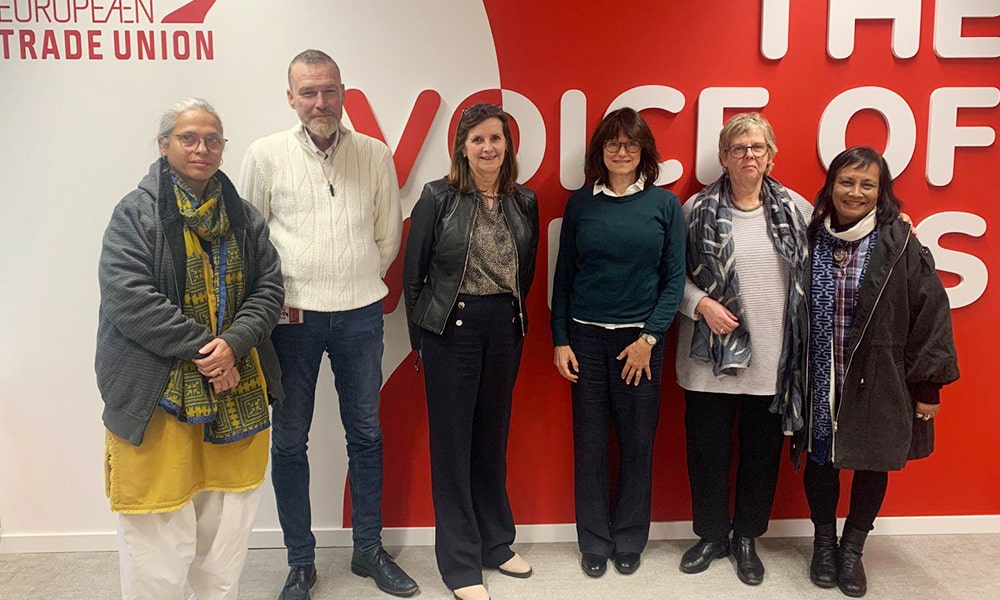By: Karin Pape, WIEGO Europe and ILO Advisor
At the beginning of February 2025, a small HNI-WIEGO delegation went to Berlin, Brussels and Paris to engage with potential allies to advocate for the inclusion of homeworkers in companies’ due diligence operations.
The delegation consisted of Suntaree Saeng-Ging (Member of the HNI Executive Committee), Zehra Khan (General Secretary of the Home-Based Women Workers Federation – HBWWF in Pakistan) Marlese von Broembsen (Senior Researcher and Policy Advisor to WIEGO’s Law Programme) and Karin Pape (WIEGO Europe and ILO advisor).
The idea for the trip came up when the EU Corporate Sustainability Due Diligence Directive (CSDDD) was adopted in June 2024. EU Member States would have two years time to transpose the Directive into national law. We wanted to make sure that homeworkers’ rights are included when it comes to national transposition of the EU CSDDD.
HNI, with the support of WIEGO, had been working for three years to ensure that homeworkers are included in the scope of the EU CSDDD. And we were successful!
We met with a series of partners: supportive NGOs, multi-stakeholder initiatives, trade unions and others. We prepared a position paper and infographics, as well as two video clips (video 1, video 2) to illustrate the situation and present demands of homeworkers. We showed that there are 49 million homeworkers globally and that they are a substantial part of global supply chains.
Supportive organizations – Hostile policy environment
However, meanwhile the political landscape has changed everywhere.
During an EU Council meeting in Budapest on 8 November 2024, the President of the EU Commission, Ursula von der Leyen, indicated she would introduce a proposal to amend three key pillars of the European Green Deal through an “Omnibus Law”: the Cooperate Sustainability Due Diligence Directive (CSDDD), the Corporate Sustainability Reporting Directive (CSRD) and the Taxonomy Regulation. The communicated intention is to make Europe “simpler and faster”. Despite official statements, such as during the press conference after the EU meeting in Budapest: “The content of the laws is good. We want to maintain it and we will maintain it”(minute 29), in practice this means that the Directives of the Omnibus proposal are open for complete re-negotiations.
Opposition against watering down protective EU regulations
When we arrived in Brussels, we were asked to join a protest action on 6th February 2024 outside where the EU commission was meeting with corporate lobbyists.
According to ETUC communication, there was a total of 57 business representatives, two trade union representatives, 10 NGOs and none of the sustainable businesses requesting EU law for fair and sustainable competition were invited.
Apart from the Brussels based NGO coalition networks and trade union organizations which protested watering down the content of the concerned EU directives, there are several business initiatives which call on the EU Commission to keep the content of the CSDDD and rather concentrate on timely implementation.
Among others the following business initiatives went public:
- Green Central Banking
- More than 200 financial sector actors, including 162 asset owners and asset managers with a combined €6.6 trillion assets under management, signed a joint statement calling on the EU Commission to preserve the integrity and ambition of the EU’s sustainable finance framework.
- Companies from various sectors sent a letter on 17th February 2025 expressing their support for keeping the EU’s sustainability due diligence and company reporting rules.
- Some of France’s largest companies, among them Amundi and EDF, signed a letter to EU policymakers not to water down ESG rules call
- The Association of Ethical Stakeholders published on 14th February on its website that an Omnibus proposal will create costly confusion and lower protection for people and the planet
With the help of the Clean Clothes Campaign (CCC) we met with around 15 NGO’s and networks, which have supported an inclusive EU due diligence directive. Many of them were not aware of the dimension of subcontracted workers in global supply chains, including homeworkers.
The detailed proposal by the EU commission was published on 26 February 2025.
Changes which are proposed are among others:
- To postpone the start of CSDD by one year
- To reduce the sequence of reporting
- To reduce the scope to direct business partners (tier 1)
- To eliminate the obligation to terminate business relationships (under certain conditions) in the case of non-compliance of business partners
- To reduce the number of stakeholders which need to be involved
- The definition of sanctions is now in the power of EU member states. The EU will only publish guidelines
If the EU Parliament and the EU council adopt these proposals it would be very difficult – if not impossible for homeworkers to claim labour rights under the new CSDDD.
Our personal visits strengthened the relationships to supportive organizations, and we are therefore in a good starting position to develop an adapted strategy to fight for homeworkers’ labour rights.



